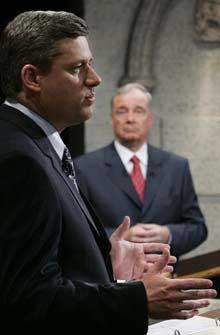 |
|
|
With Round One — the live French-language debate — complete, the leaders of the four major parties who sparred on French-language television last evening — in a sometimes spirited two-hour debate that many believe could have profound consequences for the June 28 vote — are ready to square off again tonight in a live English-language debate, at 5 p.m. PDT.
 “Hey, maybe he’s not so scary, after all” Paul thinks to himself. “Nah, on 2nd thought, he really is.” |
For the most part, the French-language debate was a front-runners’ duel, with Prime Minister Paul Martin and Conservative Leader Stephen Harper sparring over who could best handle the all-important issue of health care after June 28.
Staying above the fray, at least to some extent, Martin focused his attack on the Conservatives, saying their $90 billion spending programme would not be able finance an unprecedented increase in funding to the military, and still find a way to provide for an already stretched health-care system. “When you look at his programme, it is impossible to find the $50 billion (for health care),” he said of Harper. “Either he is going to cut in health care, or in other services. You can’t find $50 billion in a period of five years — I know the numbers.”
For his part, Harper rejected the allegation: “The increases for health care in our programme are more than 2 1/2 times more than (the amount) for national defence,” he said.
Bloc Québécois leader Gilles Duceppe was pleased to get out of the debate without having to respond to questions on the sovereignty issue. “I was ready to face their questions,” a smiling Duceppe said after the debate.
As for New Democratic Party leader, Jack Layton …
Elections must be about ideas and about hope to build a green and prosperous society. We have to establish ties with progressive minded people in Québéc and across Canada by working — by doing so and working together, we have achieved positive results, the Kyoto Protocol, our position to the war in Iraq, human rights for same-sex couples and for women, work for social housing, and also the struggle for seasonal workers.
— NDP leader, Layton
Layton wasted no time in going after the Prime Minister’s record as finance minister in the 1990s, and said his hunger to pay down the national debt created “social deficits” Canadians could not afford.
Layton then tangled with Harper on the question of Canada’s involvement in the U.S.-led missile defence programme. “We think that Mr. Bush’s administration presents proposals that Canadians don’t want to follow. So why are you not listening to Canadians when they say they do not want to have militarization of space?” Layton said.
As far as the debates go, there are those among the political pundits who feel Prime Minister Martin came out snarling (or at least the hope is that he will in tonight’s English-language debate), while others are not so sure.
Whatever the case, in a federal election this close — and with so many voters still undecided — the importance of tonight’s English-language debate to focus on issues of concern to Canadians, and to more starkly elucidate the differences between the four major party platforms — knockout blow, or lack thereof, notwithstanding — presents an opportunity for the four major party leaders, as well as all Canadians, to focus on the Canada we would choose for our families, and for our neigbours.
For insight into Stephen Harper’s policies, as well as important 2004 federal election news events, click on VanRamblings’ full Decision Canada coverage.